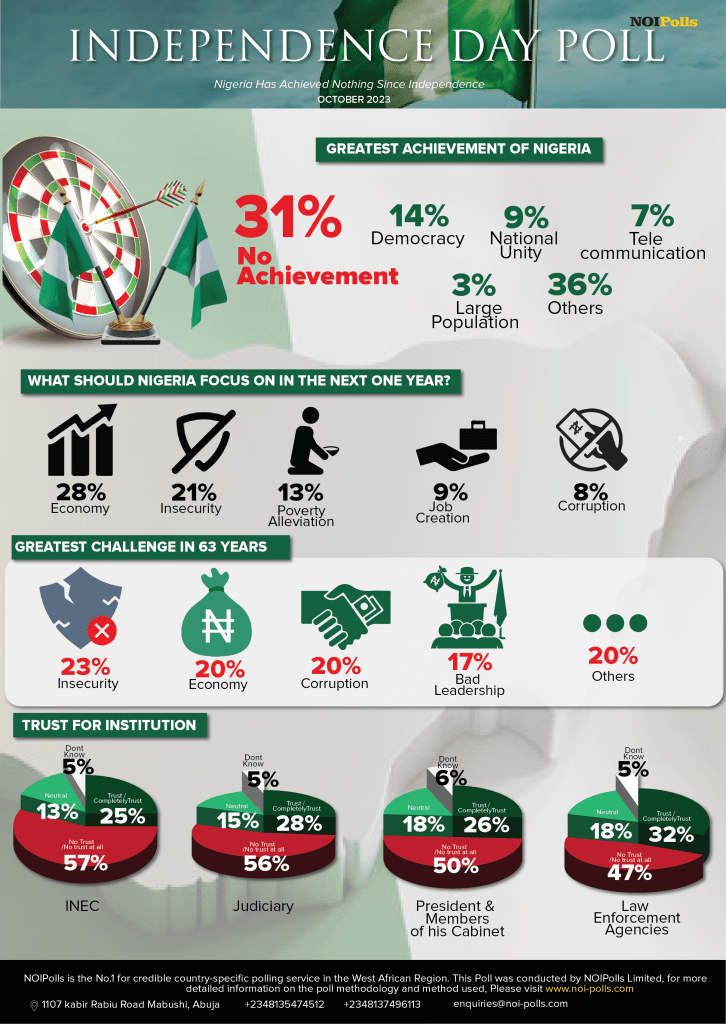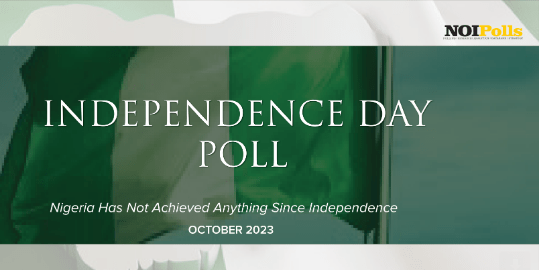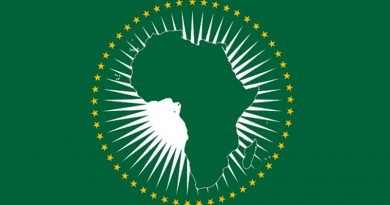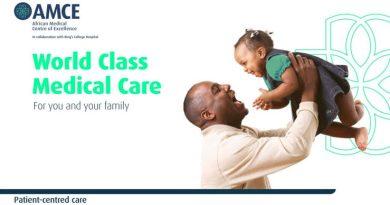No Achievement since Independence – NOIPolls
According to the annual Independence Day Poll results provided by NOIPolls Limited, 31% of adult Nigerians believe their country hasn’t accomplished anything since gaining independence in 1960. In addition, 23% of Nigerians listed insecurity as one of the biggest issues the country has experienced since becoming independent. Other difficulties highlighted include the economy (20%), corruption (20%), poor leadership (17%), and ethnic/tribal conflict (8%) among others.
Nigerians still point to various accomplishments the country has made since gaining its independence, despite the difficulties. Democracy (14 percent), national harmony (9 percent), and telecommunication (7 percent) are the top three accomplishments. A huge population (3%), electricity (3%), education (3%), security (3%), and social cohesion (3%), among other factors, are also mentioned.
28 percent of Nigerians said the economy was the most crucial issue their country should focus on in the coming year, closely followed by insecurity (21 percent). Other issues highlighted include reducing poverty (13%) and its related issues of job creation, corruption (8%), poor governance (3%), power (3%), and education (3%).
Intriguingly, when respondents were asked which nation has had a beneficial influence on Nigeria’s political and economic progress since her independence, the United States of America (27%) was ranked first, followed by China (24%) and the United Kingdom (17%). Israel, Ghana, France, Saudi Arabia, Niger, and Russia are among the other nations mentioned and account for two percent of the total. It is important to note that 22% of Nigerians believe that since independence, no country has had a positive influence on Nigeria’s political and economic progress.
Survey History
Nigeria observes Independence Day as a legal national holiday on the first of October. On October 1, 1960, Nigeria declared her independence from British domination. The government and the people of Nigeria observe the occasion each year with ceremony and pomp.
Activities to mark the occasion, however, have decreased during the past ten years. This is a crystal-clear illustration of the situation of the country. Nigeria will celebrate its 63rd anniversary of independence with a low-key event this year, according to Mr. George Akume, Secretary to the Government of the Federation, who made the announcement at a press conference in Abuja. The decision to reduce the celebrations was made in light of the nation’s economic difficulties. The celebration is low-key due to the reality on the ground, he continued, adding that no world leaders have been invited. The theme for the celebration, however, is “Nigeria @ 63, Renewed Hope for Unity and Prosperity”[1].
This year’s Independence Day Anniversary is an opportunity for Nigerians to reflect on their difficulties and accomplishments while outlining practical solutions to build on their achievements because expectations for Nigerians have not been realized.
To find out how Nigerians felt about our post-Independence progress, NOIPolls conducted a survey on the occasion of our country’s independence.
Survey Results
The first survey question asked adult Nigerians what they thought the nation’s greatest accomplishment during the previous 63 years was. Therefore, it asks, “In 63 years, what do you think has been Nigeria’s greatest accomplishment?” Results showed that a bigger percentage of respondents (31 percent) said Nigeria has not made any progress. On the other hand, some respondents (14 percent), national unity (9 percent), and telecommunication (7 percent) think the nation has made considerable strides in these areas. A big population (3%), electricity (3%), education (3%), security (3%), and social cohesion (3%), among other accomplishments, are also listed.

Further research reveals that 8% of those surveyed cited independence, fuel subsidies, the entertainment sector, hunger and poverty, and lack of unity as some achievements. Additionally, according to survey results, 16% of Nigerians surveyed either not know or refused to state their position.
The study also aimed to find out what Nigerians believed was the most crucial problem that needed to be resolved in the following year. According to analysis, a higher percentage of Nigerians (28%) addressed the economy. The reduction of poverty (13 percent), the development of jobs (9 percent), insecurity (21 percent), and corruption (8 percent) come after this. The following difficulties are also mentioned: poor governance (3%), electricity (3%), education (3%), dollar exchange rate (3%), inflation (3%), fuel issue/refinery (3%), and infrastructure (3% each). However, only 4% of Nigerians identified the constitution, healthcare, electoral changes, and attitude change as the top problems that needed to be resolved in the upcoming year.
Analysis of the responses reveals that the majority of respondents (23%) named insecurity as our country’s biggest challenge since independence. More investigation finds that the economy (20%), corruption (20%), poor leadership (17%), and ethnic/tribal conflict (8%) are the main issues. Other issues mentioned include an excessive reliance on fuel and crude oil (3%), extreme poverty (3%), power (3%), education (1%), border security (1%), and unrest (1%).
On a scale of 1 to 5, the study also aimed to gauge Nigerians’ degree of faith in important national institutions like INEC, the judiciary, the president and his cabinet, and the law enforcement forces. As a result, it asks, “How much do you trust the following institutions, on a scale of 1 to 5, where 1 equals complete trust and 5 equals complete lack of trust? According to research, the majority of Nigerians (57%) do not trust INEC; 56% do not trust the court; 50% do not trust the president and his cabinet; and 47% do not trust law enforcement.
Analysis also reveals that 25% of Nigerians who responded positively to the question of whether they trust INEC and 24% of Nigerians who responded positively about the judiciary. 26 percent of Nigerians have faith in the president and his cabinet, compared to 32 percent who have faith in law enforcement. However, further investigation reveals that just a small percentage of respondents (21%) either do not know or choose not to respond to the survey question.
The study also gauges Nigerians’ perceptions of the nation or nations they believe have had an influence on Nigeria’s political and economic development over the previous 63 years. The United States was named by more Nigerians (27%) than China (24%) or the United Kingdom (18%), according to the research. Israel (2%), Ghana (2%), France (2%), Saudi Arabia (2%), Niger (2%), and Russia (2%), among other nations, are also named. Similar percentages can be seen in Germany, Canada, and India. 7 percent of respondents are unsure. However, 22% of respondents claimed that no other nation had an impact on Nigeria in this way.
Conclusion
The majority of Nigerians, or 28 percent, indicate that the economy, followed by insecurity (21 percent), is the single most critical issue the nation has to solve in the coming year. According to the results, more Nigerians (31 percent) stated that 63 years after gaining independence, their country has made no progress. The U.S. (27%) followed by China (24%) and the U.K. (18%) were the top nations cited by Nigerians as having had an impact on their country’s political and economic development since independence. Israel (2%) is among the others, followed by Ghana (2%), France (2%), Saudi Arabia (2%) Niger (2%) and Russia (2%) in that order.
Similar percentages can be seen in Germany, Canada, and India. 7% of respondents indicated that they were unsure. Interestingly, 22% of respondents claimed that no other country had an economic and political impact on Nigeria.
impact on Nigeria.
Survey Techniques
The survey was performed during the week of September 25, 2023. It involves conducting telephone interviews with 1,000 randomly chosen Nigerians, 18 years of age and older, who own phones and represent the country’s six geopolitical regions, 36 states, and the Federal Capital Territory (FCT). Five languages—Igbo, Hausa, Yoruba, Pidgin English, and English—were used for the interviews.
Although the results were statistically accurate, with a margin of error of plus or minus 4.65%, we acknowledge that the use of telephone polling alone has the drawback of excluding Nigerians who do not own phones. Nevertheless, we take into consideration our telephone, with the nation’s teledensity estimated by the Nigerian Communications Commission (NCC) to be over 100%.
approach to polling is appropriate. We can safely support the validity of our methodology and approach given the meticulous scientific procedure of randomization and stratification used. The best company in West Africa for nation-specific polling services is NOIPolls Limited. On numerous socioeconomic and political concerns in Nigeria, we periodically undertake opinion surveys and studies. You may get more details at www.noi-polls.com.
Disclaimer
NOIPolls Limited has created this press release to provide information on all of the topics included in the paper. Please take note that while we are happy to share the results of our polls with the general public, all we ask is that NOIPolls be given credit for creating the polls whenever and wherever they are used, mentioned, or published. The background information in this document is based on data from a variety of sources that NOIPolls believes to be reliable, but it makes no claims that it is accurate or complete. NOIPolls hereby certifies that all the opinions expressed in this document accurately reflect the opinions of respondents who were surveyed for the poll.
While reasonable care has been taken in the preparation of this document, NOIPolls disclaims all liability for any inaccuracies in the facts or opinions contained herein or for actions taken as a result of information in this report. Any ratings, projections, estimates, comments, or views expressed here represent an assessment as of the document’s publication date. The opinions and content in this document may not be current with NOIPolls’ findings and/or reasoning if the document’s date is out of date. SOURCE: NOIPolls




